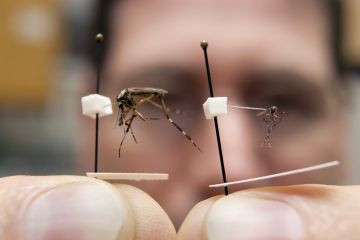Giant Mosquitoes Begin Invasion In Central Florida; No More Harmful, But Can 'Feel Like A Small Bird Has Landed On You'

Psorophora ciliata — affectionately called the gallinipper by some — has made an early summer debut in Florida's Seminole County.
Despite their massive size — 20 times heavier than the average mosquito — and vampiric thirst, gallinippers pose no added health risks to humans. And according to Doug Carlson, mosquito control director for Indian River, County, Fla., the bite they deliver is only slightly more painful.
"The gallinippers are so big they're certainly very noticeable," Carlson said. "It can feel like a small bird has landed on you."
However, natural resources agent for the St. Lucie Extensions Cooperative Service, Ken Gioeli, was less optimistic. "They can bite right through your clothing and give you a good pinch," he told West Palm Beach-based network WPTV this past March, "more painful than an ordinary mosquito bite."
The insect's origin remains partially unclear. Experts say these creatures spawned from the heavy rains of Tropical Storms Debbie and Andrea, during which eggs that have lain dormant for years can hatch unexpectedly. Once hatched, gallinippers often grow to about the size of a quarter.
Experts advise people to remove any standing water around their homes and wear the proper mosquito repellent when going outside. The good news is, gallinippers tend to be pasture mosquitoes, according to Gene Lemire, pasture control manager for Martin County, "biting mostly cattle and horses," so their threat to humans should be mostly inconvenience.
Spring and summer are traditionally insect invasion months on the East Coast, as this past April saw rat-sized, house-eating snails in Florida, and New Yorkers woke up in cold sweats from dreams of cicadas mating by the millions.
Eroding foundations and mating calls notwithstanding, the gallinippers probably will not do much damage in the Florida area. If it's any comfort, University of Florida entomologists are staying light-hearted.
"If mosquitos were motorcycles, this species would be a Harley Davidson—," the University quipped back in March "big, bold, American-made and likely to be abundant in Florida this summer."
Phil Kaufman, entomologist at the University of Florida, and his colleagues have prepared a document informing people about the mosquito, which can be downloaded off of the University's website.



























